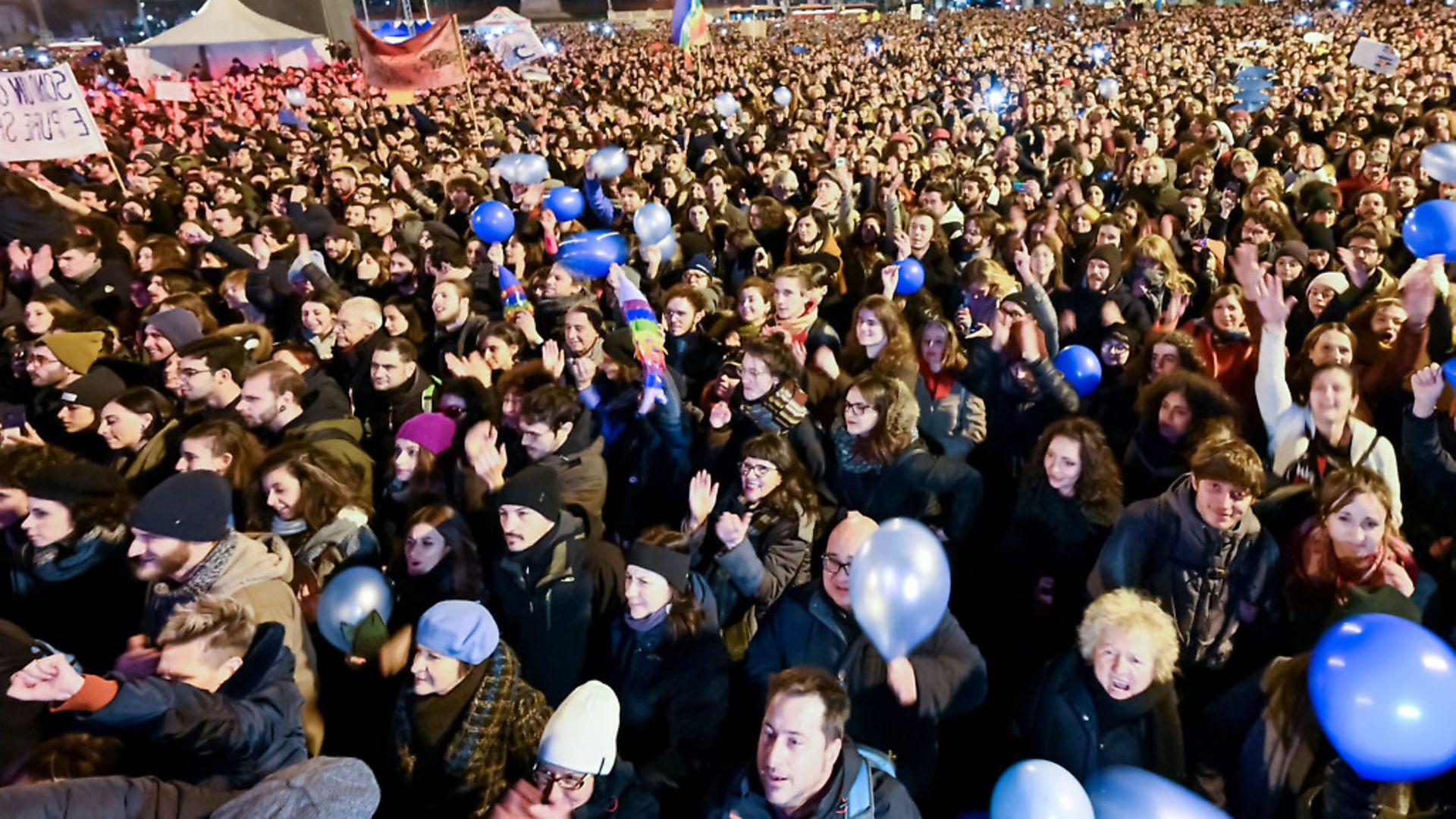
ALICE FIGES on the remarkable rise of the sardine movement
Last autumn four graduates set up a Facebook event called “6,000 sardines against Salvini”. They wanted to encourage people to turn up in Bologna’s Piazza Maggiore on November 14, to make sure the gathering outnumbered the attendance at Matteo Salvini’s election rally taking place just a 10-minute walk away, in the city’s Paladozza Stadium. The organisers encouraged people to arrive with their own cardboard costumes as part of a non-violent flash mob. The reference to the fish was intended to reflect the way the protesters – while vulnerable and insignificant as individuals – could become a powerful force when working closely together, as if in a shoal. The name represents a deliberate riposte to Salvini’s divisive anti-migrant rhetoric.
In the event, turnout far exceeded expectations, with between 12,000-15,000 people turning up. “Bologna non si lega!” (“we will not be bound”), was the chant, a pun on Salvini’s party’s name, Lega Nord, and the verb legarsi. The protest eventually developed into student street parties around Via del Pratello and Piazza San Francesco, the city’s historically anarchist district. The anti-fascist anthem Bella Ciao could be heard from the crowd.
The Bologna movement sparked reactions over the following weeks, with synchronised protests emerging in more than 30 Italian cities. The largest took place in Rome’s Piazza San Giovanni with a turnout of 100,000. Indeed, the protests were not even confined to Italy, with anti-Salvini events in Berlin, Brussels, Paris, New York and London, where a faction, Le Sardine UK, has been set up.
Yet a paradox of inclusive movements is their ability to divide, and the movement has faced criticism from some on the left. Among Bologna’s leftist circles, opinions have ranged from ben intenzionato (well-meaning), to insensato (pointless), to descriptions of the leaders as deficienti (morons). For critics on the moderate left, the sardines represent just another ‘flash in the pan’ protest, in the vein of Italy’s anti-Berlusconi i girotondi and ‘purple people’ movements of the late 1990s and 2000s. While those demonstrations expressed discontent they did nothing to curtail Il Cavaliere’s rise to power.
Indeed, the main criticism against the sardines is their inability to construct a clear political programme, failing to offer more than an expression of discontent – a criticism also often levelled at the Five Star movement. The radical left are deeply suspicious of the movement’s call to entrust power to “competent” and “sensible” political bodies, which they interpret as meaning the centrist PD, EU technocrats and other bastions of the status quo. The radical left also question the sardines claim to be a ‘youth movement’, pointing out the number of older ‘boomers’ and families who take part in their protests, often in fish-inspired fancy-dress.
The movement’s spread across Italy has also, for many, diluted its appeal. Originally established as a Emilia-Romagna-specific demonstration, it has become something quite different. Its protest in Rome became embroiled in controversy when CasaPound, the neo-fascist party was allowed to take part, arguing that its participation reflected the sardines’ spirit of inclusion. Organisers said there had been a misunderstanding and issued an apology, declaring neo-fascist groups would not be welcome again. But the incident reflected the challenges facing a new movement, with little organisation or experience to call upon, and forces pulling it in different directions.
Still, in Emilia-Romagna, the movement’s objective remains resolute and straight-forward: to halt the progress of the Lega in this weekend’s elections. This means encouraging people to turandosi il naso (hold their noses) and vote tactically for the PD – despite a string of recent controversies, including last year’s bulldozing of a popular occupied social centre in the city, XM24, and a raft of policies that are fairly unappetising for many of Italy’s disillusioned voters.
The results will reveal how successful the sardines have been in this endeavour, and may give an indication of what the movement will do next.
The four graduate leaders who set it up have said they do not intend to form a political party, but that does not mean that the organisation – which has raised significant amounts of money – will fade away.
Their successes have already been significant: inspiring those frightened by the anti-migrant, anti-LGTBQ+ rhetoric of the Lega and its supporters, and contradicting Salvini’s assertion that he represents the true ‘will of the people’.
If the sardines’ energy can be channelled into something organised and constructive, it might provide inspiration for other movements across Europe where currently only Spain’s populist Podemos party have been able to translate grassroots support into parliamentary power. Could the sardines really end up challenging the big fish?








